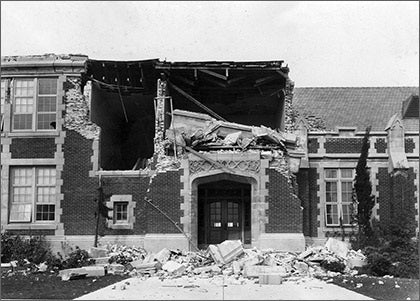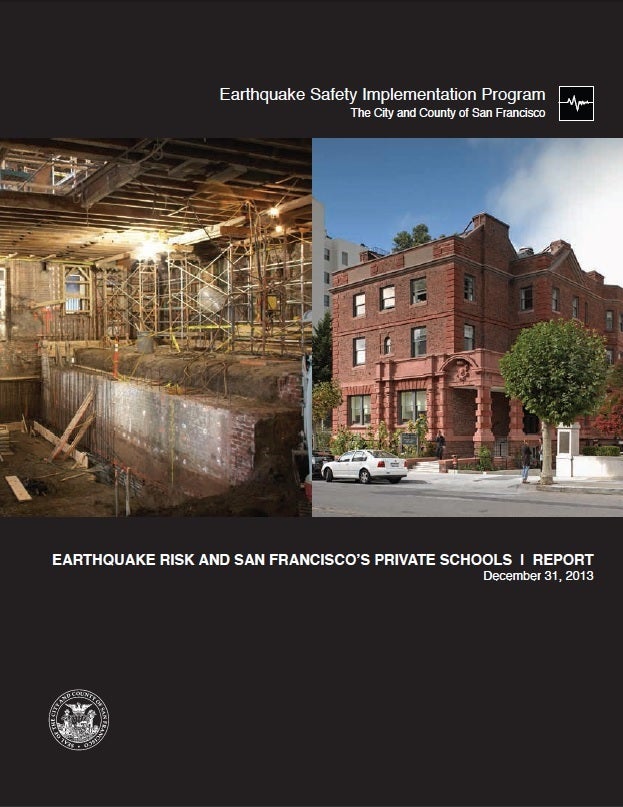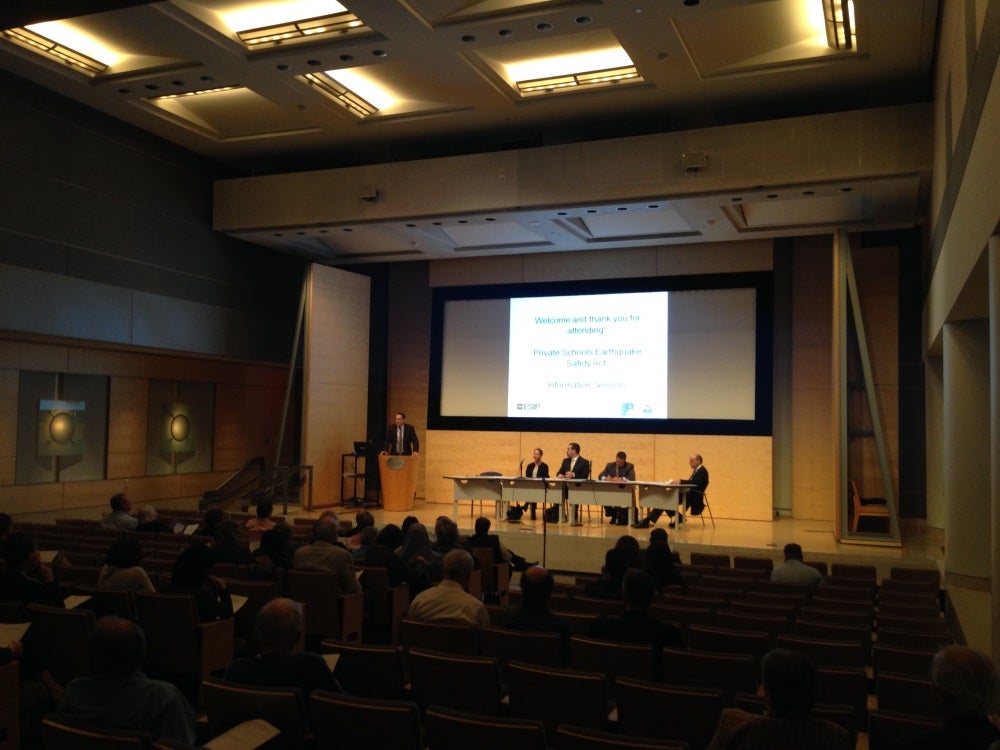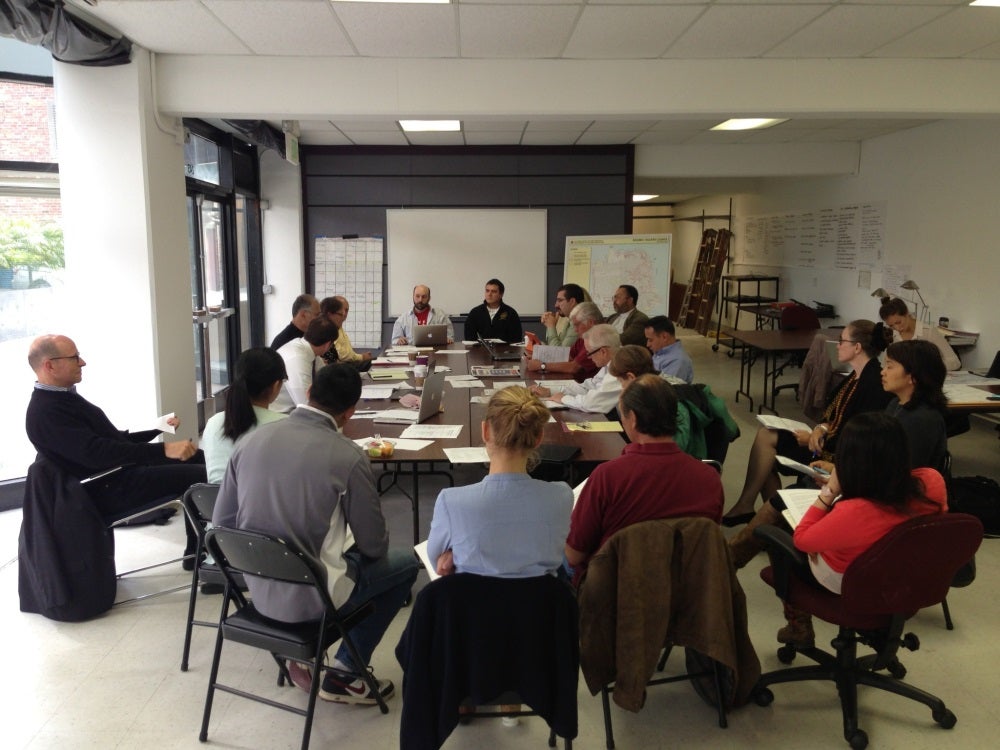Private Schools
Resources
Seismic Safety in California's Schools (PDF)
The Community Action Plan for Seismic Safety (CAPSS)
Private School Reference
FEMA E-74
Reducing the Risks of Non-Structural Earthquake Damage
California Emergency Management Agency (CalEMA)
Schools Non-Structural Checklist
Red Cross Ready, Schools
The California Great Shake Out
(ESIP Task A.6.f)

1933 Long Beach Earthquake killed 115 people and damaged several schools leading to the passage of the Field Act.
The Private Schools Earthquake Safety Working Group, comprised of volunteer parents, school representatives, other interested persons, and City staff, studied the technical and policy issues related to the earthquake risk of private school buildings in San Francisco, and has proposed ideas for how the City may best address private school safety. The group explored challenging issues such as community expectation for school safety, evaluation of earthquake risk, and potential building improvement opportunities. In late 2013 the group issued its report. Following this report, the Earthquake Safety Implementation Program (ESIP) worked with the Mayor's Office to introduce legislation requiring the seismic evaluation of select buildings in all of San Francisco's private schools. This ordinance, which was developed with a consensus from a group of concerned parents, school administrators, and community members, passed 11-0 at the Board of Supervisors and was signed into law by the Mayor on October 1, 2014. This ordinance is now in effect. Please review this website for more details about this program.
Private Schools Earthquake Safety Working Group Report
The Private Schools Earthquake Safety Working Group has issued a report examining the earthquake risk of private schools in San Francisco. This report makes several recommendations to the City for action and represents a year of meetings and research by the working group--including monthly meetings with community members as well as private school parents, board members, and administrators; consultations with and presentations from industry experts; and detailed research from noted earthquake public policy experts. It is important to note that this work considers only private, independent, charter, religious, and other non-public schools and not public schools.

Download the FULL REPORT HERE
Download the Executive Summary Here
Private Schools Earthquake Evaluation Program
The Legislation
The following documents are the ordinance, the administrative bulletin used to understand the background and intent of the legislation, as well as the sample evaluation guidance document and the scoping document used by schools to report to the Department of Building Inspection which buildings will be evaluated and which will not.
Private Schools Mandatory Evaluation Ordinance
Administrative Bulletin 109
Scope Report
Template Evaluation Document
Click here to order the evaluation criteria (ASCE 41-13) for this ordinance.

Special Information Session of the Private Schools Earthquake
Safety Working Group
Quick Facts About This Program
- San Francisco’s private schools are vital to our communities and play an essential role in educating more than 24,000 children. Currently private schools are not required to meet the same level of seismic safety as public schools.
- The focus of this ordinance is to begin a meaningful conversation about seismic safety in our City’s private schools. We must start that conversation now and with knowledge of our schools’ safety. Earthquake evaluation is the first step in this process.
- Only buildings primarily used for the education and care of K-12 students or school administration that meet the building code definition of Educational “E” occupancy are required to be evaluated. All other non-educational buildings, such as churches, accessory residential buildings or similar uses, are exempt.
- This ordinance is not a retrofit requirement. Many schools may seek to improve any shortcomings found during the evaluation process. Schools will be able to complete any work necessary on their own terms—having as long as needed to raise funds and complete that work, without the demand of a time limit.
- This ordinance requires a life-safety level of evaluation only, submitted to the Department of Building Inspection within three years of the ordinance’s effective date.
- Continuing our year-long outreach process, the Earthquake Safety Implementation Program will be case managing each school’s individual needs during this process, from addressing concerns during the legislative process to identifying structural engineers to locating finance resources.
For additional questions and concerns please call us at 415-554-4925.
Presentations about this legislation:
- Earthquake Safety Implementation Program Presentation
- Private Schools Earthquake Safety Working Group Presentation
- Structural Engineering Presentation
- Disabled Access Presentation
- Legislation Fact Sheet
Complying With This Program
All non-public school buildings are required to be seismically evaluated under this program. Administrators or school owners are required to complete the two following actions:
- Submit a completed Scope Report to the City by November 2, 2015. Building owners, school administrators, or others may complete this form.
- Complete a seismic evaluation, per the requirements of San Francisco Building Code Section 3428.2, and submit a report, per the requirements of San Francisco Building Code Section 3428.4, to the Department of Building Inspection by November 1, 2017. This evaluation and the evaluation report must be completed by a licensed structural engineer.
Exceptions to this requirement:
- Buildings that are occupied by 25 or less persons for less than 12 hours per week or four days in any given day are not required to be evaluated. Buildings fitting this exemption should be listed on the Scope Report in Section 3B.
- Schools with an enrollment of 25 or fewer students are not required to evaluate.
- Buildings that are not classified as building code occupancy Group E (Section 305 of the California Building Code), such as churches or other places of religious worship, accessory residential buildings, or other non-education uses are not required to be evaluated. Buildings fitting this exemption should be listed on the Scope Report in Section 3B.
Tips for Completing the Scope Report:
- Please be sure to clearly include contact information, including phone number, contact name, and email address so that we can confirm receipt of your form
- Please be sure to list all buildings to be evaluated (Section 3A) as well as all buildings that are exempt per the exemptions above (Section 3B)
- Please be sure to list all buildings, if any, that your school intends to voluntarily upgrade.
Please Note: An upgrade, as reported in Section 4 of the Scope Report, does not serve as an exemption from this evaluation requirement. Also, a building must be strengthened to the requirements of Section 3428.5 of the San Francisco Building Code to receive the exemption stated in Section 3428.5.
Program Contacts & Resource Guide
E: quakesafeschools@sfgov.org
T: (415) 554-4925
For Engineering Questions:
Diane Yin, Ph.D., P.E., S.E.
Department of Building Inspection (DBI)
T: (415) 558-6011
Resources
Click Here for a Database of City Contacts and Engineering Firms
Please note that listing in this database does not constitute any form of an endorsement, but rather it serves as an informational resource for schools.
Mailing List
Click here to add yourself to our mailing list.
Private Schools Earthquake Safety Working Group
The Earthquake Safety Implementation Program was convened as a working group of parents, school board members, school representatives, city staff, design professionals, and interested residents to explore the issue of private school earthquake safety. Please click here to download the Private Schools Earthquake Safety Working Group Statement. This group has completed its work.

The Private Schools Earthquake Safety Working Group meeting at the EPICENTER
Meeting 1 – December 6, 2012, 9 AM – 11 AM, City Hall Room 370
Agenda, Minutes
Meeting 2 – January 17, 2013, 9 AM – 11 AM, City Hall Room 305
Agenda, Minutes
Meeting 3 – February 28, 2013, 9 AM – 11 AM, City Hall Room 034
Agenda, Minutes
Meeting 4 – March 28, 2013, 9 AM – 11 AM, City Hall Room 034
Agenda, Minutes
Meeting 5 – April 25, 2013, 9 AM – 11 AM, City Hall Room 034
Agenda, Minutes
Meeting 6 - May 16, 2013, 9 AM - 11 AM, City Hall Room 034
Agenda, Minutes
Meeting 7 - July 18, 2013, 9 AM - 11 AM, The EPICENTER, 245 Third Street
Agenda, Minutes
Meeting 8 - August 15, 2013, 9 AM - 11 AM, The EPICENTER, 245 Third Street
Agenda, Minutes
Meeting 9 - September 19, 2013, 9 AM - 11 AM, The EPICENTER, 245 Third Street
Agenda, Minutes
Meeting 10 - October 17, 2013, 9 AM - 11 AM, The EPICENTER, 245 Third Street
Agenda, Minutes
Meeting 11 - December 12, 2013, 9 AM - 11 AM, The EPICENTER, 245 Third Street
Agenda, Minutes
Meeting 12 - February 13, 2014, 9 AM - 11 AM, The EPICENTER, 245 Third Street
Agenda, Minutes
Meeting 13 - March 27, 2014, 9 AM - 11 AM, The EPICENTER, 245 Third Street
Agenda, Minutes
Special Info Session - April 10, 2014, 3 PM - 5 PM, Koret Auditorium, San Francisco Library, Main Branch, 100 Larkin Street
Agenda
Special Info Session - May 8, 2014, 3 PM - 5 PM, Koret Auditorium, San Francisco Library, Main Branch, 100 Larkin Street
Agenda
Meeting 14 - May 29, 2014, 9 AM - 11 AM, The EPICENTER, 245 Third Street
Agenda, Minutes
Meeting 15 - August 25, 2014, 9:30 AM - 11:30 AM, The EPICENTER, 245 Third Street
Agenda, Minutes